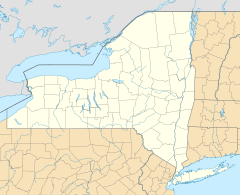Johnson Hollow Brook facts for kids
Quick facts for kids Johnson Hollow Brook |
|
|---|---|
|
Location of the mouth of Johnson Hollow Brook
|
|
| Country | United States |
| State | New York |
| County | Delaware |
| Physical characteristics | |
| Main source | 42°18′10″N 74°29′34″W / 42.3027778°N 74.4927778°W |
| River mouth | Schoharie Creek 1,129 ft (344 m) 42°20′03″N 74°26′25″W / 42.3342499°N 74.4401482°W |
Johnson Hollow Brook is a small waterway, often called a river or stream, located in Delaware County, New York. It flows into the Schoharie Creek near the town of Prattsville. This brook is an important part of the local water system, carrying water from its starting point to larger rivers.
Contents
What is Johnson Hollow Brook?
Johnson Hollow Brook is a natural stream of fresh water. It's smaller than a big river but plays a key role in the environment. Brooks like this help move water across the land.
Where is it Located?
This brook is found in the beautiful Delaware County area of New York State. It's part of a region known for its hills and forests. The brook's journey ends northwest of the community of Prattsville.
Journey of the Brook
Every brook has a beginning, called its source, and an end, called its mouth. Johnson Hollow Brook starts in a specific spot and then flows downhill. It collects water as it travels.
Part of a Bigger System
The brook's journey finishes when it joins the Schoharie Creek. This creek is much larger and eventually flows into the Mohawk River, which then joins the Hudson River. So, Johnson Hollow Brook is a small but important link in a much bigger network of waterways that eventually reach the Atlantic Ocean. This whole connected system is called a watershed.
Importance of Small Streams
Small streams like Johnson Hollow Brook are vital for many reasons.
- They provide homes for various plants and animals.
- They help keep the soil healthy and prevent erosion.
- They contribute to the overall water cycle, moving water from land to larger bodies of water.
- They are a source of fresh water for local ecosystems.


